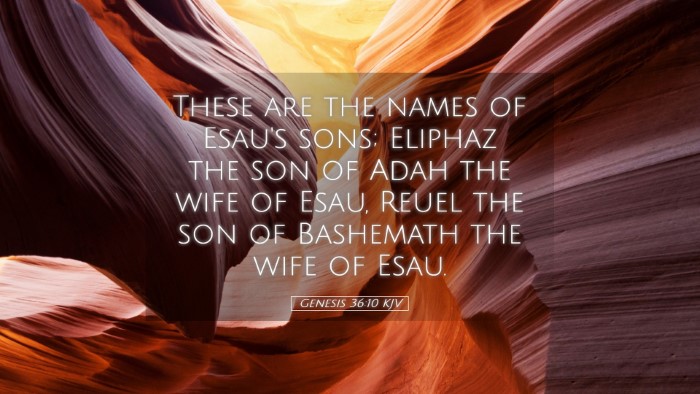Commentary on Genesis 36:10
Text of Genesis 36:10: "These are the names of the chiefs of Esau's sons: Eliphaz the son of Adah, the wife of Esau; Reuel the son of Basemath, the wife of Esau."
Introduction
The genealogy presented in Genesis 36 is critical for understanding not only the lineage of Esau but also the broader context of Israel's history. Genesis 36:10 marks the beginning of a detailed account of Esau's descendants, who became the Edomites. This passage not only identifies the sons of Esau but also sets the stage for the conflicts that arise between Israel and Edom. The insights derived from various public domain commentaries accentuate the significance of this verse.
Insights from Matthew Henry
Matthew Henry emphasizes the importance of familial lineage in the context of biblical history. He notes that Esau's sons, particularly Eliphaz and Reuel, are pivotal figures in understanding the Edomite nation. Henry points out that the mention of their mothers, Adah and Basemath, suggests an emphasis on the heritage and origins of the Edomites.
- Eliphaz: Henry observes that Eliphaz was notably the firstborn son, and he stresses that in many cultures, the firstborn holds a place of importance. This status often affects the lineage and leadership within families.
- Reuel: He also notes Reuel as a significant name that means "friend of God," which could imply a relationship of favor and community influence that is valuable in biblical narratives.
Insights from Albert Barnes
Albert Barnes adds further layering to the interpretation by discussing the sociopolitical implications of the names listed in Genesis 36:10. Barnes suggests that the listing serves not merely to document genealogies but also to affirm the legitimacy of Esau's descendants as a recognized and established people.
- Chiefs of Edom: He interprets this verse as an introduction to the leadership structure of the Edomites, indicating a well-formed community with their own rulers, which reflects a societal organization akin to that of Israel.
- Connection to Israel: Barnes draws parallels between the genealogies of Jacob and Esau, suggesting that the chapter underscores God's providence in maintaining distinct yet interconnected lineages which are significant in the unfolding of biblical history.
Insights from Adam Clarke
Adam Clarke takes a more nuanced approach to the names mentioned in Genesis 36:10, providing etymological insights that bear theological implications. Clarke discusses the cultural significance of names in the biblical narrative.
- Names and Their Meanings: He points out that the meanings of Eliphaz ("God is fine gold") and Reuel offer insight into the spiritual aspirations associated with these individuals. This highlights that even in genealogical accounts, there is a profound emphasis on the divine's involvement in human affairs.
- Role of Women: Clarke also draws attention to the mothers of the sons, particularly noting the cultural context of women within these genealogies. Their naming may serve to reinforce the claim of legitimacy and heritage, thereby recognizing the vital role that women play in the continuation of family lines.
Theological Implications
The genealogical records in Genesis, especially those in Genesis 36:10, raise critical theological questions pertaining to identity, community, and divine purpose. From the insights of the commentators discussed, several key theological implications emerge:
- The Sovereignty of God: The listing of Esau’s descendants emphasizes God’s sovereign choice in the unfolding of history, showing that both Israel and Edom serve critical functions in God’s redemptive narrative.
- Disputed Heritage: As Esau’s lineage develops in opposition to Jacob’s, the conflict between Edom and Israel reflects the ongoing struggle for identity and divine blessing within biblical texts.
- Continuity and Covenant: The mention of Esau’s sons within the covenantal narrative signals continuity in God’s purpose, affirming that His promises extend beyond immediate familial lines.
Conclusion
Genesis 36:10 serves as a powerful reminder of the interconnectedness of biblical narratives, emphasizing the roles of both men and women in the unfolding story of God’s people. Commentaries by Matthew Henry, Albert Barnes, and Adam Clarke illuminate our understanding of this passage, demonstrating that even genealogies are rich with theological significance. For pastors, students, theologians, and scholars, the exploration of this verse encourages deeper reflection on the implications of lineage, identity, and divine providence in biblical history.


